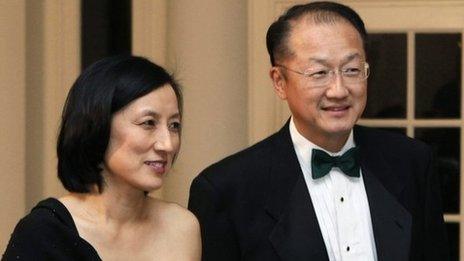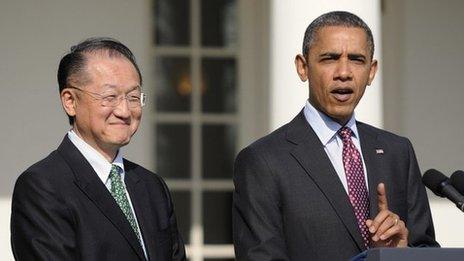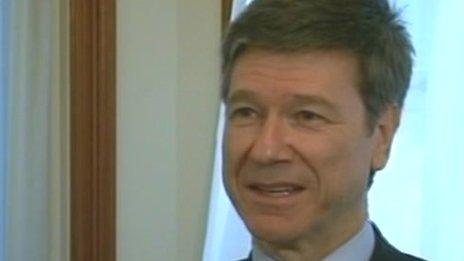Obama names surprise World Bank candidate Jim Yong Kim
- Published
- comments
President Obama: "I am nominating Dr Kim to be the next president of the World Bank"
President Obama has nominated Korean-born US academic Jim Yong Kim to be the next president of the World Bank.
The nomination of the Dartmouth College president and development expert is a surprise as he was not mentioned as a contender over the past weeks.
A US citizen has led the Bank since it was founded in 1944, but developing nations say it is time for change.
The World Bank confirmed that there are three candidates - with the other two coming from Nigeria and Colombia.
After the deadline for nominations to replace the current president, Robert Zoellick, passed, the World Bank said Nigerian Finance Minister Ngozi Okonjo-Iweala and Jose Antonio Ocampo, a former Colombian finance minister, have made the shortlist along with Dr Kim.
But with the US holding the most votes at the World Bank, which has 187 members, the vote on the next president should be a formality.
International experience
President Barack Obama stressed Dr Kim's international experience in his statement announcing the nomination.
"It is time for a development professional to lead the world's largest development agency," he said.
"Jim has truly global experience. His personal story exemplifies the great diversity of our country... and his experience makes him ideally suited to forge partnerships all around the world."
"This is one of the most critical institutions fighting poverty and providing assistance to developing countries in the world today," Dr Kim said in a letter to students at his university, external.
"After much reflection, I have accepted this nomination to national and global service."
Dr Kim, 52, had not been among the names rumoured to be under consideration by President Obama, which included former White House adviser Larry Summers, Pepsi head Indra Nooyi, and UN ambassador Susan Rice.
Dr Kim is a leading figure in global health. As well as his work at the WHO, he co-founded the health organisation Partners in Health in 1987.
Born in Seoul, he moved with his family to the US at the age of five.
Paul Farmer, a friend of Dr Kim's and the chair of the Department of Global Health at Harvard University, praised the nomination.
"I can think of no one more able to help families, communities, and entire nations break out of poverty, which is the stated goal of the World Bank," he said.
"He has worked in rural villages and squatter settlements just as he has worked in the halls of power and privilege."
Following Dr Kim's nomination, US development economist Jeffrey Sachs who had been put forward by several smaller, developing countries, announced his withdrawal from the race.
He had argued that the World Bank should be led by a development expert.
"Prof Sachs supports Dr Kim 100% and with complete enthusiasm," his spokeswoman said.
Strong contest
Three African countries - Angola, Nigeria and South Africa - have endorsed the nomination of Mrs Okonjo-Iweala.
"The endorsement is in line with the belief that the appointment of the leadership of the World Bank and its sister institution, the International Monetary Fund, should be merit-based, open and transparent," the statement said.
Speaking at a news conference, Mrs Okonjo-Iweala said: "I consider the World Bank a very important institution for the world, and particularly for developing countries deserving of the best leadership, so I look forward to a contest of very strong candidates.
"And am I confident? Absolutely."
Dr Jim Yong Kim takes part in the Dartmouth College Idol competition
The nomination of Mr Ocampo was backed by Brazil and not his own country.
Colombia's current finance minister, Juan Carlos Echeverry, said on Thursday that the country was focusing on a bid for the presidency of the International Labour Organization rather the World Bank.
Calls to end 'monopoly'
The World Bank and the International Monetary Fund were created at the conference at Bretton Woods in 1944 as a means to regulate trade between nations in the aftermath of the Great Depression and World War II.
A US national traditionally heads the World Bank while a European runs the IMF - currently France's Christine Lagarde.
But emerging economies have become increasingly unhappy with this arrangement and are pushing for change.
In a recent editorial, external, three former chief economists of the World Bank - Francois Bourguignon, Nicholas Stern and Joseph Stiglitz - argued for an end to the US "monopoly" on running the institution.
"To say it is merit-based, and to choose an American repeatedly, shows scant respect to the citizens of other countries," they wrote.
Fredrik Erixon, a former World Bank economist, told the BBC that the selection process was "anachronistic" but he still expected the White House nominee to be the successful candidate.
The current president, Robert Zoellick, is to step down from his role at the institution when his five-year term comes to an end on 30 June.
Mr Zoellick, 58, was nominated for the role in 2007 by George W Bush.
- Published23 March 2012

- Published5 February 2015
- Published23 March 2012

- Published18 March 2012
